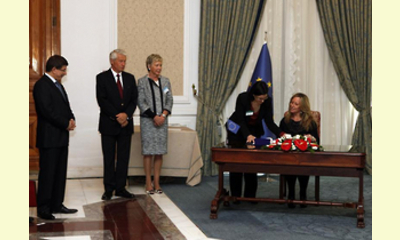|
|
Europe Treaty on Violence Against Women to Take Effect
un articulo por Human Rights Watch Reprinted by permission. © 2014 Human Rights Watch. All rights reserved
On April 22, a ground-breaking European treaty on violence against women moved one step closer to entering into legal force, with Andorra becoming the 10th country to ratify it. With this milestone met, the treaty will become binding on August 1, 2014. Countries ratifying the treaty are obligated to protect and support victims of violence.

Signing ceremony for convention on preventing violence against women and combating domestic violence © 2011 Reuters
click on photo to enlarge
The treaty, the “Council of Europe Convention on Preventing and Combating Violence Against Women and Domestic Violence” – known informally as the “Istanbul Convention” – is the first European treaty specifically targeting violence against women and domestic violence. It sets out minimum standards on prevention, protection, prosecution, and services. Countries ratifying must also establish services such as hotlines, shelters, medical services, counselling, and legal aid.
“This is a defining moment for women in Europe for whom the home is a place of danger,” said Gauri van Gulik, global women’s rights advocate for Human Rights Watch. “This treaty will oblige governments to take concrete steps to help women and girls facing violent attacks.”
One in three women in the European Union has experienced some form of physical and/or sexual assault since the age of 15, according to an EU Fundamental Rights Agency survey. An estimated 35 percent of women worldwide have experienced physical or sexual violence by a partner, or sexual violence by a stranger. The World Health Organization calls this a public health problem of epidemic proportions.
The treaty was adopted in Istanbul on May 11, 2011. More than half (25 of 47) of the countries that are Council of Europe members have signed the convention (the initial step before fully agreeing to be bound by the treaty through ratification). To date, ten countries have ratified: Albania, Austria, Bosnia and Herzegovina, Andorra, Italy, Montenegro, Portugal, Serbia, Spain, and Turkey.
The Istanbul Convention addresses gaps in national responses to violence against women. Across Europe, violence and the failure of governments to prevent it is a daily, brutal reality for women and girls, Human Rights Watch research over the past few years has shown.
In Hungary, police inaction, ineffective restraining orders, insufficient shelter spaces, and legal and policy gaps leave women survivors of domestic violence at risk of further abuse.
In Belgium, fear of deportation prevents many migrant women who experience domestic violence from getting the protection they need.
In Turkey, gaps in the law and implementation failures by police, prosecutors, judges, and other officials make the protection system unpredictable at best, and deadly at worst.
The treaty defines various forms of violence against women (including sexual violence, physical and psychological violence, forced marriage, female genital mutilation, and stalking), and calls for their criminalization.
A group of independent experts with the power to conduct country visits and review regular reports will monitor implementation of the treaty. The experts will be elected within a year following the entry into force.
The treaty is already propelling positive changes, Human Rights Watch said. For example in Turkey, in March 2012 parliament adopted a new law that, despite flaws, improved the legal framework for protection from violence and was largely based on the Istanbul Convention.
“Violence against women is not a force of nature – it can be stopped,” van Gulik said. “This convention is set to bring about practical changes that should ultimately improve the lives of women and girls across Europe.”
(Thank you to Janet Hudgins, the CPNN reporter for this article).
( Click here for the French version or here for the Spanish version)
|








|
DISCUSSION
Pregunta(s) relacionada(s) al artículo :
Protecting women and girls against violence, Is progress being made?
* * * * *
Comentario más reciente:
:
The 47 CPNN articles devoted to this theme suggest that indeed progress is being made.

|
|









